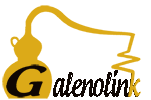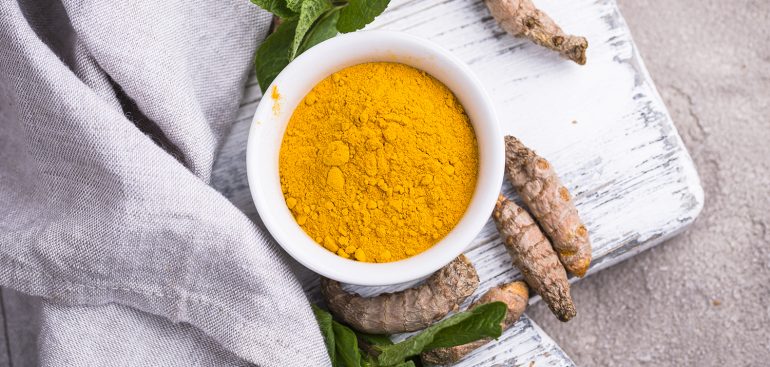Turmeric, also known as curcuma or Indian saffron, is a plant of the ginger family, native to Southeast Asia. Its rhizome is consumed as a spice and is one of the main ingredients of curry. Traditional Asian medicine systems, such as Chinese Traditional Medicine and Ayurveda, have used it to treat diseases of the skin, respiratory system, joints, and digestive system.
Turmeric extract contains four curcuminoids, being curcumin the most important one. Curcumin is a highly pleiotropic compound (meaning it has many pharmacological activities) thanks to its molecular structure: it exists in the form of tautomers, which are isomers that can rearrange some of their chemical bonds spontaneously, changing shape and facilitating binding with a wide range of enzymes. Curcumin is a powerful antioxidant, acting as a free radical scavenger, preventing lipid peroxidation and free radical-induced DNA damage. It inhibits inflammation and pain and has shown antifungal and antibacterial activities. Furthermore, it suppresses a number of pathways related to cell growth, differentiation and malignant transformation, exhibiting a massive potential in the treatment of certain cancers.
Curcumin could be used in the prevention or treatment of many diseases, but its poor bioavailability limits the application. In rats, following oral administration, only 30%-40% of the dose is absorbed; after absorption, it undergoes fast biotransformation processes in the liver, and after 24 h, only traces of curcumin can be found in the blood, even after high oral doses. Despite its low bioavailability, several pre-clinical studies and clinical trials, have confirmed its therapeutic effectiveness, so it is suspected that the therapeutic activity is not exerted by curcumin itself but its main metabolites.
For the treatment of certain diseases, including some cancers and neurodegenerative disorders, more bioavailable formulations of curcumin have been developed. New pharmaceutical forms include pairing it with piperine, which increases absorption at the intestinal level, adsorption in different types of matrices, and the combination of curcumin with some of its metabolites. Different types of techniques have also been used to reduce its particle size and encourage absorption.
Nevertheless, both traditional medicine and more recent clinical trials confirm the effectiveness of curcumin in the treatment of some liver diseases, without its low bioavailability significantly diminishing its effectiveness.
In the liver, curcumin inhibits factors like NF-κβ, which is related to inflammation and fibrosis; it prevents the fatty acid accumulation that may result from metabolic imbalances; exerts a powerful antioxidant activity; blocks the replication of the Hepatitis C Virus, inhibits the mutagenic effect induced by certain toxins, such as aflatoxins; and slows down the growth of certain hepatic carcinomas.
For all the above reasons, curcumin has an interesting potential in the prevention and treatment of many hepatic diseases, such as injuries induced by alcohol and other toxins, non-alcoholic fatty liver disease, and, in general, acute and chronic hepatic inflammation, as well as fibrosis and cirrhosis caused by metabolic, infectious or autoimmune factors. The cases of hepatic fibrosis and cirrhosis are particularly interesting because we currently have few pharmacological interventions available.
It should be mentioned that, in rare cases, turmeric supplementation can cause liver damage, and that individuals who carry the HLA-B*35:01 gene seem to be predisposed to it. Herbal supplements can be very beneficial, but they are not harmless or without side effects, so patients should always speak with a healthcare provider before taking a new supplement.

